The Vengeance of She (1968)
Directed by: Cliff Owen
Written by: Peter O'Donnell
Starring: Colin Blakely, Edward Judd, John Richardson, Olinka Berova
UK
AVAILABLE ON DVD
RUNNING TIME: 101 mins
REVIEWED BY: Dr Lenera, Official HCF Critic
Amnesia-suffering Carol is found wondering along a road in the French Riviera in some kind of trance by a van driver who tries to molest her. She flees to the relative safety of a boat owned by womanising millionaire Harry and his patient wife Sheila, and is befriended by Harry’s friend, psychiatrist Dr. Phillip Smith, who begins to fall for her. Carol is increasingly beset by dreams of some ancient place, with one man who is immortal wanting her to come to him, and another using his mind to draw her in and uttering the name “Ayesha, Ayesha”. After seemingly accidentally causing the death of Harry, Carol disappears overnight, lured towards a lost city in the Sahara Desert called Kuma….
The first two times I saw this poorly regarded, modern day sequel to Hammer’s biggest non-horror hit She, I thought it pretty lousy, but on this occasion I rather enjoyed it. There’s no doubt that it’s a slapdash production which, even more than its forebearer, suffers badly from having far too little money to help make its story and settings even partly convincing, and one wonders why on earth Hammer failed to give it a similar or even a larger budget considering how much money the first one made. Some of the plot makes little sense, the second half virtually remakes She, and there’s only a marginal attempt to make this Kuma resemble the one that existed 50 years before. However, at least on this occasion [when I was supposed to be viewing it with a more critical eye], there was something oddly compelling and even a little moving about the often weakly constructed story, what with its endlessly engaging themes of immortality, reincarnation and magic, and it probably moves at a crisper pace than the first one despite having even fewer action scenes. I still don’t think that it’s a particularly good film, but there are certainly elements of interest, and star Olinka Berova proves herself to be a better actress than Ursula Andress despite this being her only film. Why it used to be rated ‘15’ in the UK though is anybody’s guess though – there’s some scantily glad females and tame deaths by spear and a sword hanging from a chain, but probably less violence than in She.
H. Rider Haggard actually wrote three book sequels to She, and the 1935 film version took a few bits from one of them. When Hammer planned a sequel to their She within three months of its completion, it was originally meant to be called Ayesha – Daughter of She, which doesn’t sound like any of the novels. Andress was intended to star, but her contract with Hammer expired and she refused to renew it. Screenwriter Peter O’ Donnell was asked to rewrite the script, now called She: Goddess Of Love, removing some of the connections to the earlier film, but not all of them. Britt Ekland, Barbara Bouchet and Samantha Jones were considered as replacements, and Susan Denberg, who’d made such a beguiling debut in Hammer’s Frankenstein Created Woman, was eventually announced, but in the end newcomer Olga Berova, renamed Olinka Berova, was cast instead. At least John Richardson came back, his character no longer called Leo Vincey but Killikrates, the person he was a reincarnation of in She. For some reason he was dubbed, by David de Keyser. Shooting took place at MGM/EMI studios in England and in Monte Carlo and Almeria, Spain. Director Cliff Owen slipped on a sandy hill, fell, and injured his back to badly that he was unable to work, causing producer Aida Young to direct the final few days of the film’s shoot. The Vengeance Of She, unusually for a Hammer film, actually lost money, even when doubled billed with car racing drama Thunder Alley.
Our heroine is first seen wondering dazed along a road while, oddly for Hammer, a title song plays. The singer and lyric writer are sadly uncredited, as it’s a rather lovely song with words that actually link to the film and seem to be voicing the thoughts of Killikrates himself, over composer Mario Nascimbene’s catchy tune. She’s picked up and then accosted by a potential rapist, but somehow he’s ran over by his van moving by itself – or did she do it with some strange power? She’s next found stowing away on a boat that was just full of partying, drunken rich folk. The owner Harry is running away from some unspecified trouble and soon has to flee the Riviera, taking his poor wife Sheila and his mate Phillip with him. Carol tries to swim for it when the boat goes in an opposite direction from where she is trying to go, and Harry drowns trying to get her. When Carol flees again, Philip and the boat’s captain George follow, and it’s totally ludicrous that they go in exactly the same direction as she does and seem to catch up with her very easily so they can save her from kidnapping by two errant Arabs, though the rolling around down the desert hills and a jeep/horse chase aren’t badly done even though it’s odd how the jeep can’t keep up with the horse!
But it’s all quite interesting, with a heroine who just has no idea what’s going on and who reminded me of Amina from The Mummy’s Curse, dreams/visions which are slightly trippy with one of them showing people’s faces merging together, and gradual revelations which let us know that Leo/Killikrates didn’t go back to civilisation and instead remained in Kuma. He’s been convinced by Men-Hari, head of the mystical Magi, that Ayesha has been reborn in the form of Carol and is letting Men-Hari use his power to make Carol come to Kuma in return for Men-Hari being allowed to bathe in the immortality-causing flame, not knowing that Men-Hari then wants to lead the Magi in taking over the world. Then there’s good priest Za-Tor, and servant girl Sharna who’s in love with Killikrates [doesn’t she know that his previous admirer was executed by Ayesha?] and who resents Carol’s appearance. There’s quite a lot going on, in fact it’s probably too much for a script which doesn’t have the time to focus properly on much of this, and which feels the need to have a pointless middle passage where an Arab called Kassim engages in a rather Western-style magic duel with Men-Hari and who ends up being blown off a wall by a demonic wind. This is fun, but entirely gratuitous. And I can’t help but think that, while Carol is fascinating, the film would have been better told more from the point of view of Killikrates, who’s a really tragic character, hardened by loss and obsession into a cruel leader much like Ayesha. Richardson gets a really moving moment when he’s told that Carol is definitely not Ayesha [though wouldn’t leaving some ambiguity have been better?] and there’s so much pain in his face.
It all becomes more and more like a cheaper rehash of She, though it’s non-black servants called The Low Ones who revolt this time. The final scenes set in and around the flame, which is now in a totally different room containing no vegetation and which now emits from a crystal, compare very badly, with some brief fisticuffs and a totally unremarkable ending for Killikrates consisting of just routine dissolves and makeup which you can barely see. The approach to Kuma resembles that in She a bit, but the interiors are totally different and not at all ancient-like. I suppose Killikrates could have ordered it to have been re-built in the interim. There’s actually slightly more of an attempt to give an idea of the scale of the city, with one rather impressive shot of loads of people scurrying about seen from a great height: I honestly couldn’t tell if it was done with extras or special effects, but elsewhere the tiny budget laughably lets things down, with weak back projection everywhere you look; it seems that they couldn’t even get any cast members onto a moving boat. Then there’s an odd flashback where Berova wears the same garb that Andress wore when she was on her throne. She just doesn’t look enough like her, and wouldn’t it have been better if they’d used Andress footage from She considering that Carol isn’t Ayesha anyway?
Yet Berova is quite good, projecting a mix of beguiling naivety and, sometimes, Andress-like haughtiness. Edward Judd is a pleasant hero and the always dependable Andre Morrell does what he can with the pointless role of Kassim. Owen does a solid job of directing and there’s the odd nice visual, like the caves leading to the flame showing up in different hues. Nascimbene’s very prevalent score just repeats the same themes over and over again [which was usual for him], but all three are effective in their different ways, two of them evoking ancient grandeur and mystery respectively, and the other – the same tune as the song – romance, sometimes played in a pop-like arrangement. This muddled and muddle-headed effort is hard to actively dislike and one does sometimes get a feel of how good it could really have been if given the required care and the money, while elements of the story do provoke some thought. Yet I still have to conclude that it’s a failure, if in its own odd way a slightly glorious one.
[rating: 5,5/10]
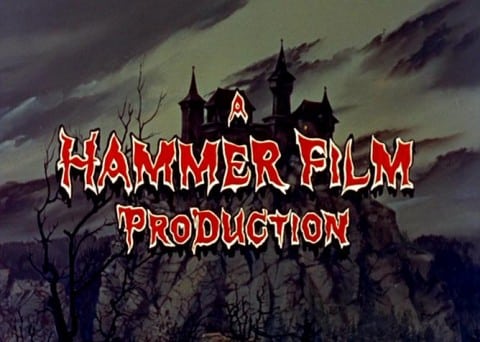
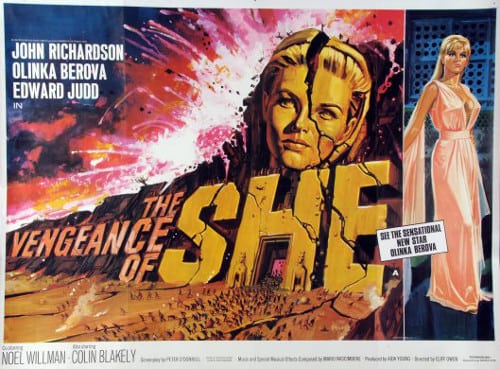
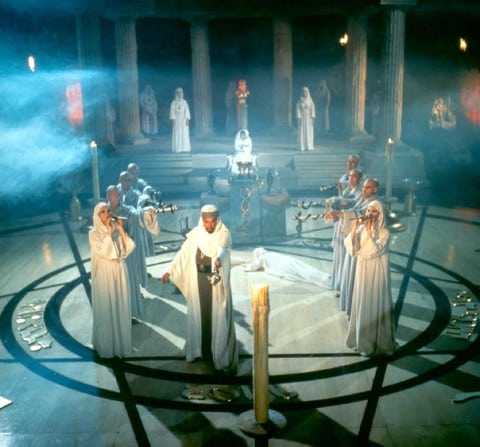
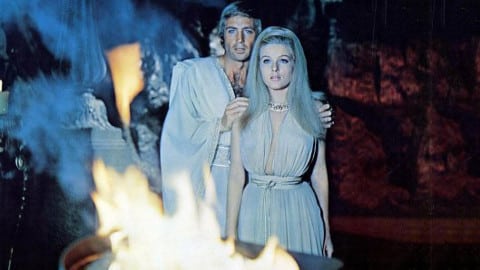

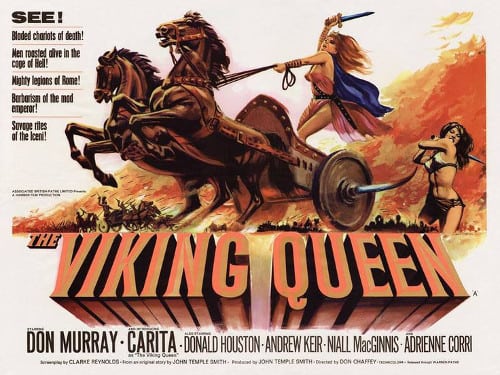
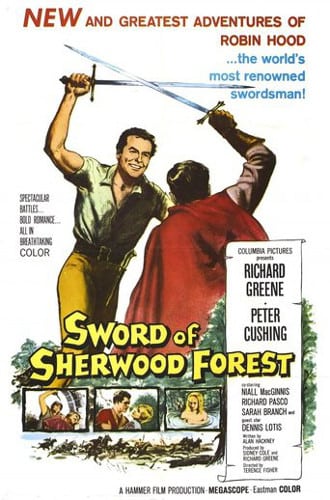
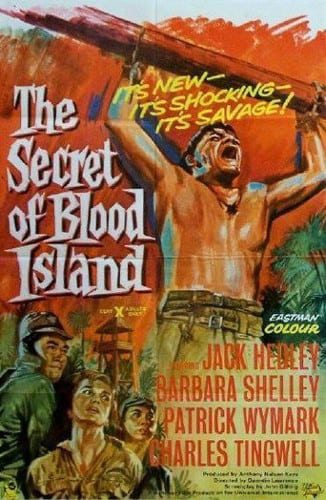
Not a patch on the original as I recall, though it’s been a while I’m not tempted to rewatch!
~ M
You’re in the next one I’m reviewing!!!!!